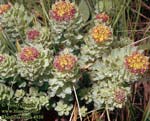Rhodiola - Natural Stress Relief

Rhodiola Rosea - also known as "Golden Root" or "Arctic Root" is adaptogenic, meaning it can help the body to adapt to stress better.
Rhodiola rosea is a popular plant in traditional medical systems in Eastern Europe and Asia with a reputation for stimulating the nervous system, decreasing depression, enhancing work performance, eliminating fatigue, and preventing high altitude sickness. Rhodiola rosea has been categorized as an adaptogen by Russian researchers due to its observed ability to increase resistance to a variety of chemical, biological, and physical stressors. Its claimed benefits include antidepressant, anticancer, cardioprotective, and central nervous system enhancement. Research also indicates great utility in asthenic conditions (decline in work performance, sleep difficulties, poor appetite, irritability, hypertension, headaches, and fatigue) developing subsequent to intense physical or intellectual strain. The adaptogenic, cardiopulmonary protective, and central nervous system activities of Rhodiola rosea have been attributed primarily to its ability to influence levels and activity of monoamines and opioid peptides such as beta-endorphins.
(Altern Med Rev 2001;6(3):293-302)
Rhodiola rosea ("golden root" or "Arctic root") is widely distributed at high altitudes in Arctic and mountainous regions throughout Europe and Asia. It is a popular plant in traditional medical systems in Eastern Europe and Asia, with a reputation for stimulating the nervous system, decreasing depression, enhancing work performance, eliminating fatigue, and preventing high altitude sickness.1 In addition to Rhodiola rosea, over 200 different species of Rhodiola have been identified and at least 20 are used in traditional medical systems in Asia.
Rhodiola rosea has been intensively studied in Russia and Scandinavia for more than 35 years. Although the majority of this research on Rhodiola rosea is unavailable for review, available literature is supportive of its adaptogenic properties. Similar to other plant adaptogens investigated by Russian researchers, such as Eleutherococcus senticosus (Siberian ginseng) and Panax ginseng (Korean ginseng), extracts of this plant produce favorable changes in a variety of diverse areas of physiological function, including neurotransmitter levels, central nervous system activity, and cardiovascular function.
Rhodiola rosea appears to offer an advantage over other adaptogens in circumstances of acute stress. A single dose of Rhodiola rosea prior to acute stress produces favorable results and prevents stress-induced disruptions in function and performance.
The clearest indication for Rhodiola rosea administration is for the asthenic condition resulting from acute or chronic overwork, which may manifest as decline in work performance, sleep disturbances, poor appetite, irritability, hypertension, headaches, and fatigue.
For a more detailed description of Rhodiola and it's health benefits (from Wikipedia) - click here
